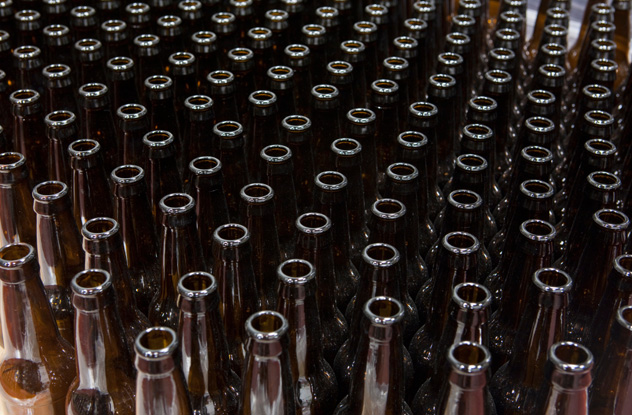5. Refrigerator
Fridges keep our food fresh and safe for our consumption. They are absolutely critical to our survival and the way we have flourished in the modern world. We also use them to keep our beers nice and cold, which is actually what they were created for.
Brewing traditionally only took place during the cooler months, as it is an exothermic process. It generates heat, and too much heat can kill the yeast and ruin the beer. For hundreds of years, blocks of ice were harvested and stored in cellars to keep the beer cool. Then came the breakthrough of mechanical refrigeration by Carl Von Linde, who was employed by the Spaten Brewery in Munich.
By the 1880s, refrigeration was common in breweries. It was expensive, but it let them brew all year round. It further let breweries grow and pop up in locations far from ice sources. This also led to the dominance of cooler lager beers . . . as well as, eventually, the presence of refrigerators in everyone’s home.
4.Glass Bottle
While not creating glass, beer was the driver behind the glass bottles that contain everything from amber ales to water, ketchup, baby milk, and medicine. This it was one of the earliest examples of large-scale mechanical production, which would flourish so incredibly in the 20th century.
Michael Joseph Owens was the man behind the machine. Owens linked up with Libbey Glass to market his product with the aim of using it to mass-produce long-neck beer bottles. Owens’s machine was a raging success. By 1903, he had created a commercial machine that could churn out 12 glass bottles per minute. By 1912, it could make 50 every minute. The machine created by Owens was used around the globe by 1915.
The company formed by Owens owned the rights to making brandy, wine, and specialty bottles. Exclusive rights were sold to Heinz for ketchup, Hazel-Atlas for general bottles, and Ball Brothers for fruit jars.
3. The Thermometer
James Joule needed the extremely specific conditions and skills he learned in his brewery to measure and define mechanical heat. For example, the ambient temperature had to be ultra-precise, he had to work alone, and he had to work for many hours uninterrupted. Under these unique constraints, forced by brewing, he performed his experiments that would affect the entire field of physics.
Joule recognized that he needed a more precise thermometer, giving us themercury model that is so key today, rather than the inaccurate air thermometers that were previously commonplace. Perhaps even more importantly, Joule devised the mechanical heat ratio in his brewery, which eventually became the basis of the science of energy.
2.Carbon Dioxide
Air was once thought to be one homogenous substance, not the combination of gases we know it is today. It was all thanks to beer that Joseph Priestley discovered carbon dioxide. And with it, he discovered the existence of individual gases.
Living next door to a brewery, Priestley observed that gas floating off the fermenting mixtures fell to the ground, indicating that it was heavier than the air around it. He had discovered carbon dioxide. In addition, he observed that it extinguished lit wood. Priestley figured out how to produce it without alcohol, inventing carbonated beverages as well, so beer also led to the creation of all your favorite fizzy drinks.
This monumental discovery inspired Priestley to figure out what other kinds of “airs” (later called gases) floated around. In the end, the heavy air coming off his beer let Priestley discover not only CO2 and oxygen but six other gases, including laughing gas—a feat unequalled.
1. communism
There was no more divisive and influential philosophical doctrine in the 19th and 20th centuries than communism. The original Communist Manifesto, written by Karl Marx and Friedrich Engels, led to over a century of international political turmoil and tension. The book would never have come about without a legendary beer-drinking session between the two men.
Both Engels and Marx were no strangers to the drop. Marx’s first year of university was a “wild rampage,” in the words of his father. The following years saw him regularly knocking back pints while finishing his PhD. Engels’s preferred tipple was wine, with a month-long tour of France seeing him drunk for almost all of it.
While traveling through Paris, Engels arranged to grab a beer with Marx. What followed was far more than a beer or two. As one historian put it, it was 10 beer-soaked days, over which Engels and Marx exchanged ideas, breaking down and formulating what would become the basis of communism—all thanks to the mind-altering amber ale.











